Write Us
We are just a call away
[ LET’S TALK AI ]
X
Discover AI-
Powered Solutions
Get ready to explore cutting-edge AI technologies that can transform your workflow!

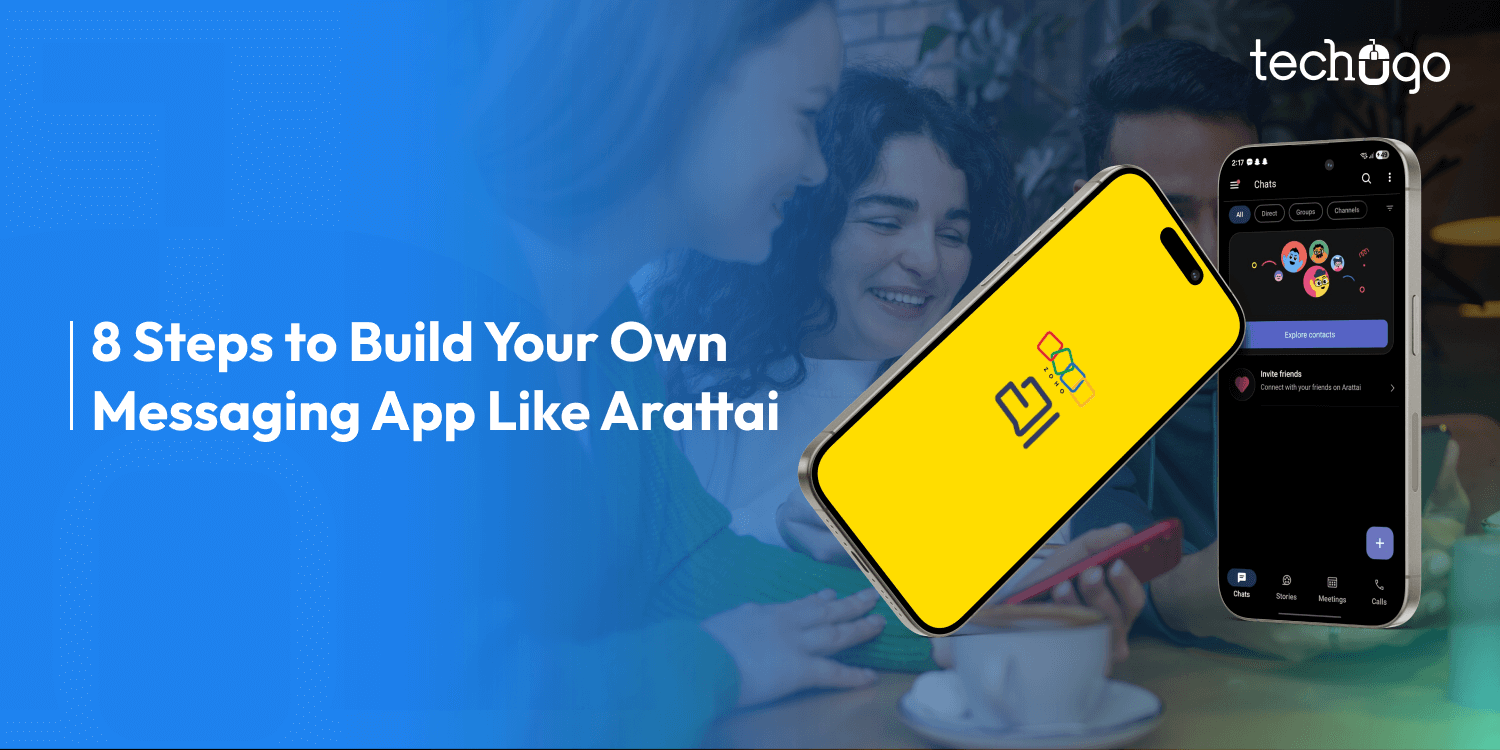
Messaging apps are now as ubiquitous as email or social media. Today’s consumers expect instant, multimedia chat on their phones. The global instant messaging app market was valued at $128.20 billion in 2024 and is projected to cross $489.18 billion by 2032. (Source: Research and Market) WhatsApp alone has over 1.7 billion daily active users.
In India, a new player, “Arattai, developed by Zoho”, has emerged as India’s own messaging app. In the chat app market, Arattai has seen a sharp increase in popularity. There has never been a better moment to build a messaging app like Arattai.
If you’re a startup or enterprise considering to build a WhatsApp alternative or an app like Arattai, this guide walks through the strategic steps.
We’ll cover a roadmap on how to build a messaging app like Arattai, core features, chat app development cost, as well as strategies to stand out. By the end, you’ll surely decide whether to go ahead with messaging app development in India or not.
👉 Must Read: Cost of Developing an AI-Powered Mobile App in 2026
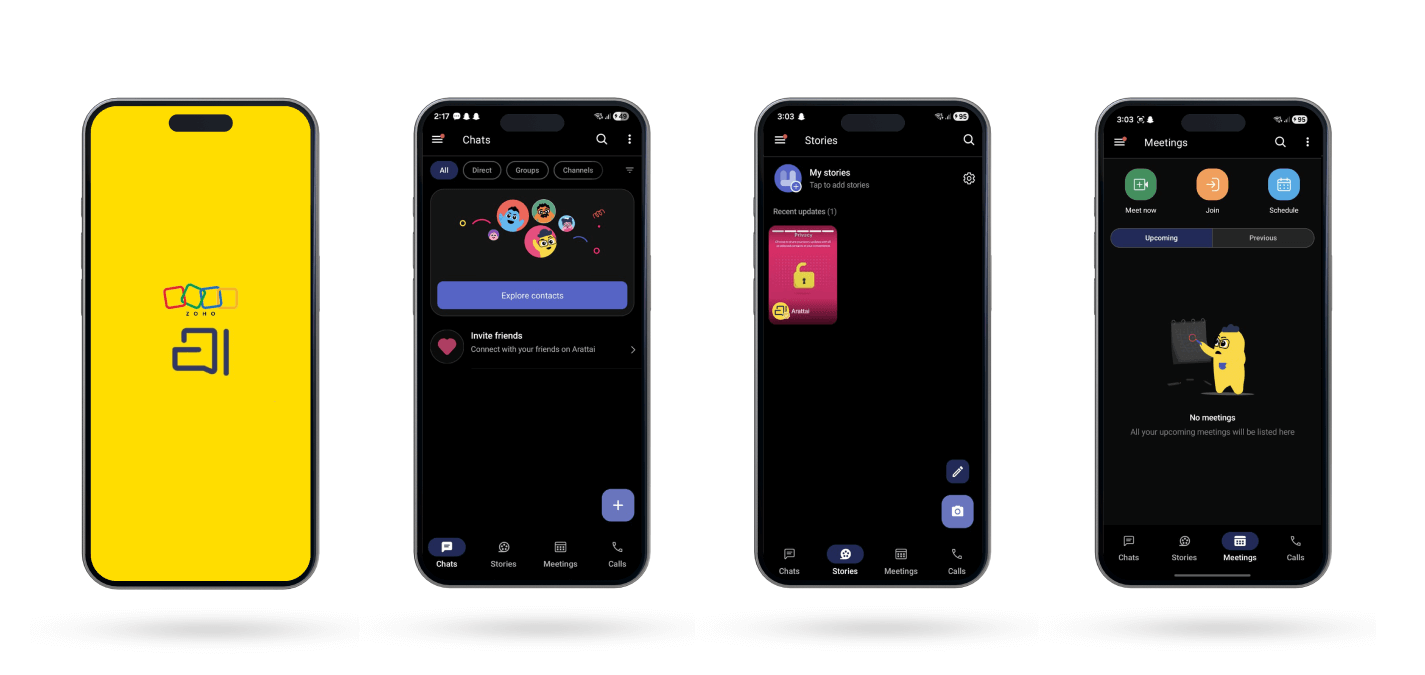
The name ‘Arattai’ itself sounds so fresh and different. In Tamil, it means “casual talk” or “chit-chat”, a perfect description for how we connect with friends and family daily.
Arattai was launched in 2021 by Zoho. It is a cross-platform messaging app made to deliver a local, secure, and privacy-first communication experience. It offers instant messaging, voice/video calls, file sharing and stories, touting “simple, secure, and Indian-made” communication. It is like India’s very own WhatsApp alternative app, made for users who value data privacy and simplicity.
The response? Massive. Arattai’s daily sign-ups jumped from just 3,000 to an incredible 350,000 within 3 days. This proves that there is a high demand for regional, privacy-focused chat apps.
What really makes Arattai stand out is its ability to run smoothly even on low-end smartphones or weak networks. This focus on accessibility and reliability gives it a clear edge, especially across emerging markets.
For startups and tech founders, choosing to build a messaging app like Arattai isn’t just about creating another chat platform. It’s about joining a fast-growing space where messaging app development meets innovation, inclusivity, and trust.
The decision to build a messaging app today isn’t just about keeping up with WhatsApp or Telegram. It’s about owning the digital experience and shaping how users connect, share, and transact.
The benefits of launching a messaging app go far beyond features. For businesses, it’s about trust, privacy, and long-term growth.
Most global chat apps often fail to meet local compliance and data protection standards. Most users don’t even know where their messages are stored, or who can access them. That’s where Arattai wins.
As a homegrown messaging app like Arattai, it hosts data on India-based servers and aligns with the nation’s digital sovereignty goals. For enterprises and government sectors, this becomes a huge selling point. When data stays local, trust grows, and so does adoption.
Now imagine you build a messaging app like Arattai with secure chat app features tailor-made for your business. You can create industry-grade governance tools, enable data protection policies, and ensure compliance across sectors like healthcare or finance, something global consumer apps rarely offer.
It’s not just chat anymore; its real-time chat app solutions built for reliability, privacy, and control.
A modern messaging app development strategy isn’t just about sending texts. It is about creating an ecosystem. The real magic happens when you combine messaging with payments, shopping, or services inside one app.
Arattai has done this smartly by integrating Zoho Pay, allowing users to send or receive money directly within chats, just like WeChat does in China. That’s the beauty of a messaging app business model that blends communication with payments, commerce, and services.
When you embed high-value features like digital payments, file sharing, or workflow tools inside your custom chat app development services, you’re not chasing ad revenue; you’re creating meaningful engagement. This shift toward privacy-first, utility-driven design is what defines the future of instant messaging apps.
People love WhatsApp, but they don’t trust Meta. Despite offering end-to-end encryption in chat apps, WhatsApp still faces criticism because its parent company profits from user data.
Arattai wins here again. It doesn’t sell data. It doesn’t show ads. It doesn’t even track users. With no ads, no trackers, and no data selling, it positions itself as the WhatsApp alternative app users can genuinely rely on. When you’re building your own app, this kind of transparency becomes your biggest strength and adds credibility.
By removing the need for data monetization, businesses or developers can focus entirely on messaging app UI/UX design, performance, and security, not ad algorithms. It’s not just ethical; it’s efficient.
So if you’re planning to build a messaging app like Arattai, take this cue – trust and transparency are the new growth currencies.
Strategy, design, and execution matter the most when you build a messaging app like Arattai or even WhatsApp. If you’re exploring how to build a chat app like Arattai, here’s how you can turn your idea into a full-fledged messaging app:
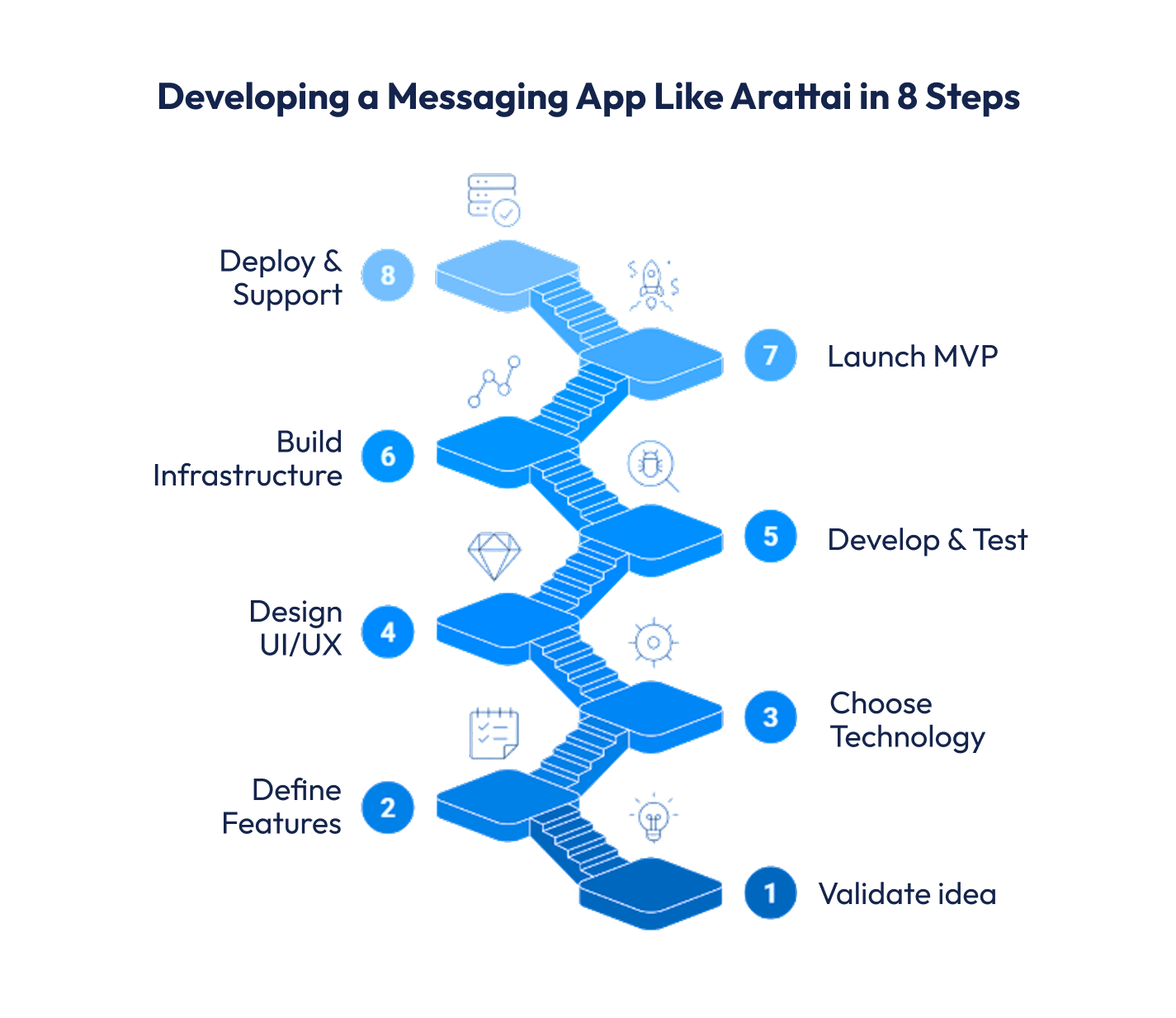
Before writing a single line of code, validate your app concept. Research your market, identify your target audience, and analyze competitors.
Are you building for a specific region, business sector, or community? Find your niche. For example, a secure messaging app for healthcare or enterprises.
Build a quick MVP (even a simple prototype) to gather early feedback and confirm user interest.
First, list the essential features of a messaging app:
Don’t forget security. Add SSL/TLS encryption for data transfer and end-to-end encryption for messages and calls to ensure user privacy. It’s a major selling point for WhatsApp alternatives.
Your technology determines the app’s performance and scalability.
A strong backend architecture ensures your chat app handles large user volumes and remains stable even under heavy load.
Your messaging app like Arattai should feel simple yet engaging. Messaging app UI/UX design must follow Material Design (Android) or Human Interface (iOS) principles.
Keep navigation easy. Chats, Contacts, and Settings should be instantly accessible.
Use clear chat bubbles, emoji keyboards, and smooth animations for message delivery. Test your messaging app UI/UX design early to avoid rework later.
Begin with the foundation:
If adding calls, integrate WebRTC and optimize for low-bandwidth networks, which are crucial for emerging markets.
Testing is key:
Set up push notifications (via FCM or APNs) to alert users about new messages. Use message queues or pub/sub services for efficient data routing.
If you want to save time, use chat APIs like Stream, CometChat, or Sendbird for backend operations.
Release a minimum viable product to a smaller user base. Track usage, crashes, and feature adoption. Real feedback helps refine the experience before scaling up.
Once your MVP is stable, launch it on Google Play, App Store, or even as a Progressive Web App (PWA). After launch, focus on updates, bug fixes, and moderation tools (spam detection, user blocking, and reporting systems).
Pro Tip:
If you’re new to development, partnering with a messaging mobile app development company can fast-track your journey. They’ll handle architecture, UX, and backend scalability, while you focus on your vision.
If you’re actually serious and want to build a messaging app like Arattai (one that can actually stand beside giants like WhatsApp, Signal, or Telegram), here are the core features users expect today.
And yes, user delight > feature dump.
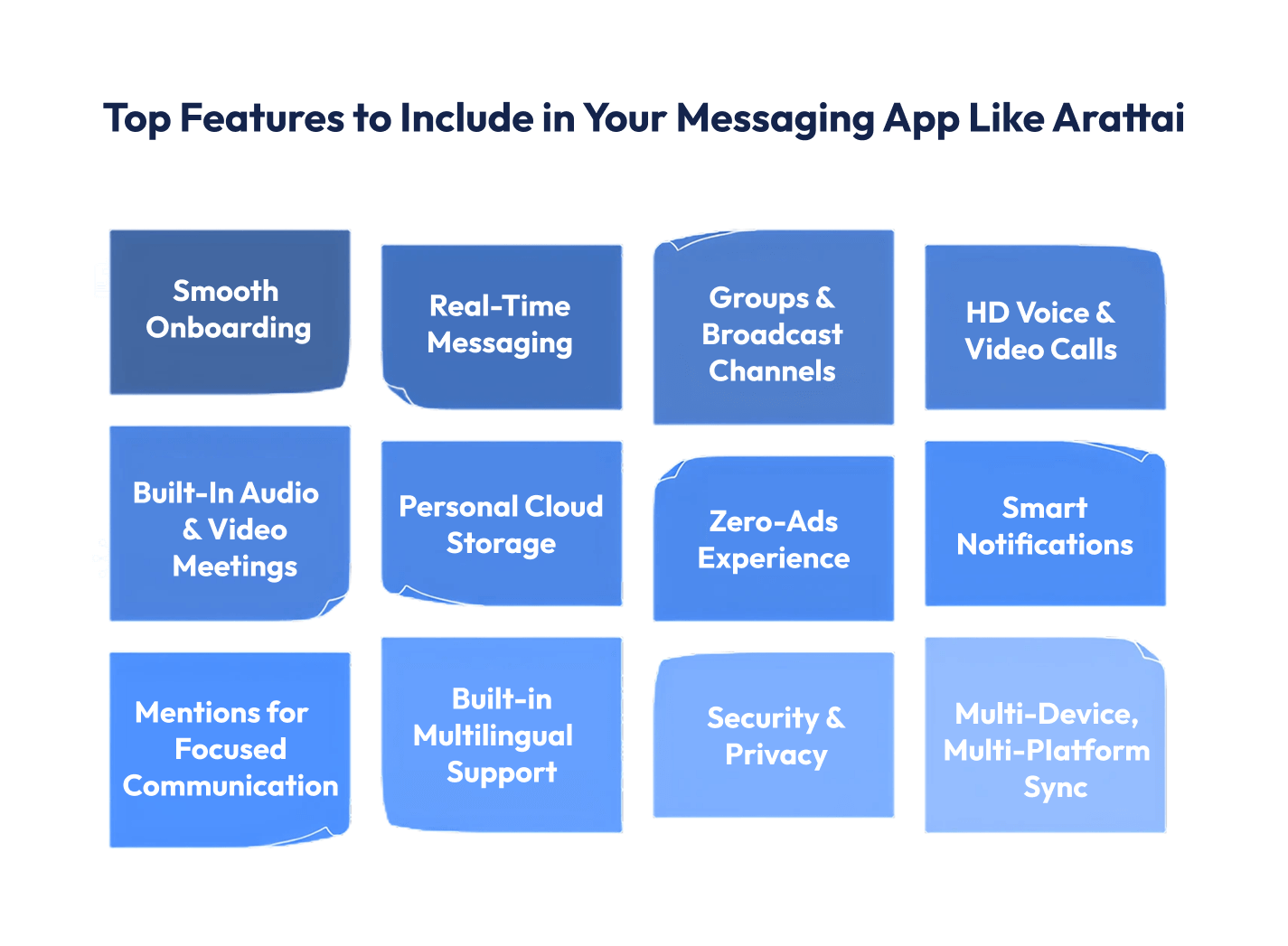 Smooth, No-Drama Onboarding
Smooth, No-Drama OnboardingSign-up should feel like a breeze, not a form-filling punishment.
Arattai nails this with phone-number login and guided permission prompts. Your app must offer frictionless entry so users can jump straight into chatting, not wrestling with setup steps.
Messaging should feel live, for example, typing indicators (user is typing), reactions, delivery ticks (reached or read), and mentions/tagging (@abc). You can also recreate a human convo, but digital. Fast, fluid, and reliable is the baseline if you’re building a WhatsApp alternative.
Two modes, two needs –
One-on-one or groups, with solid quality and low-lag performance. Arattai supports up to 50-person calls and integrated meeting flows. If you want users to ditch other apps, you must offer reliable calling.
Arattai goes beyond casual calls. It supports scheduled meetings with up to 250 participants. That’s not messaging; that’s collaboration. Strong calling + scheduling = appeal for professionals, communities, and remote users.
Users love storing stuff they don’t want to lose. Arattai’s Pocket feature lets users save media, files, and messages inside the app, no need to switch to external drives. A smart move if you want stickiness and trust.
Arattai plays the long game. No ads, no creepy monetization. It focuses on trust and user scale first. And honestly, in the messaging world, that’s the only acceptable play if you want loyalty.
Users should control the noise (per-chat alerts, channel filters, and preview toggles). The standout here is Arattai’s dedicated Mentions tab, which keeps important messages visible. It’s a win-win for productivity.
Think Slack-style mentions inside a messaging app. Users never lose track of messages that need their attention which is especially important for groups, teams, and community chats.
Language shouldn’t be a barrier. Multilingual support lets users chat comfortably and expands your global footprint. Inclusivity = retention + growth.
People don’t compromise on privacy anymore. If you want users to trust your messaging app, crypto-grade security is essential.
Peak convenience: Android, iOS, Web, Windows, Mac, Linux, and even Android TV.
Up to 5 devices with synced chats and cloud-backed media storage.
That’s true messaging freedom, not the “scan QR every time” life.
If someone’s planning to build a next-gen chat app, this is the foundational playbook.
If you want your messaging app to truly stand out, you can’t just copy what WhatsApp or Arattai are doing.
You have to go beyond features and focus on what’s next, such as personalization, AI integration, privacy, and user empowerment. Here’s how to outsmart the competition:
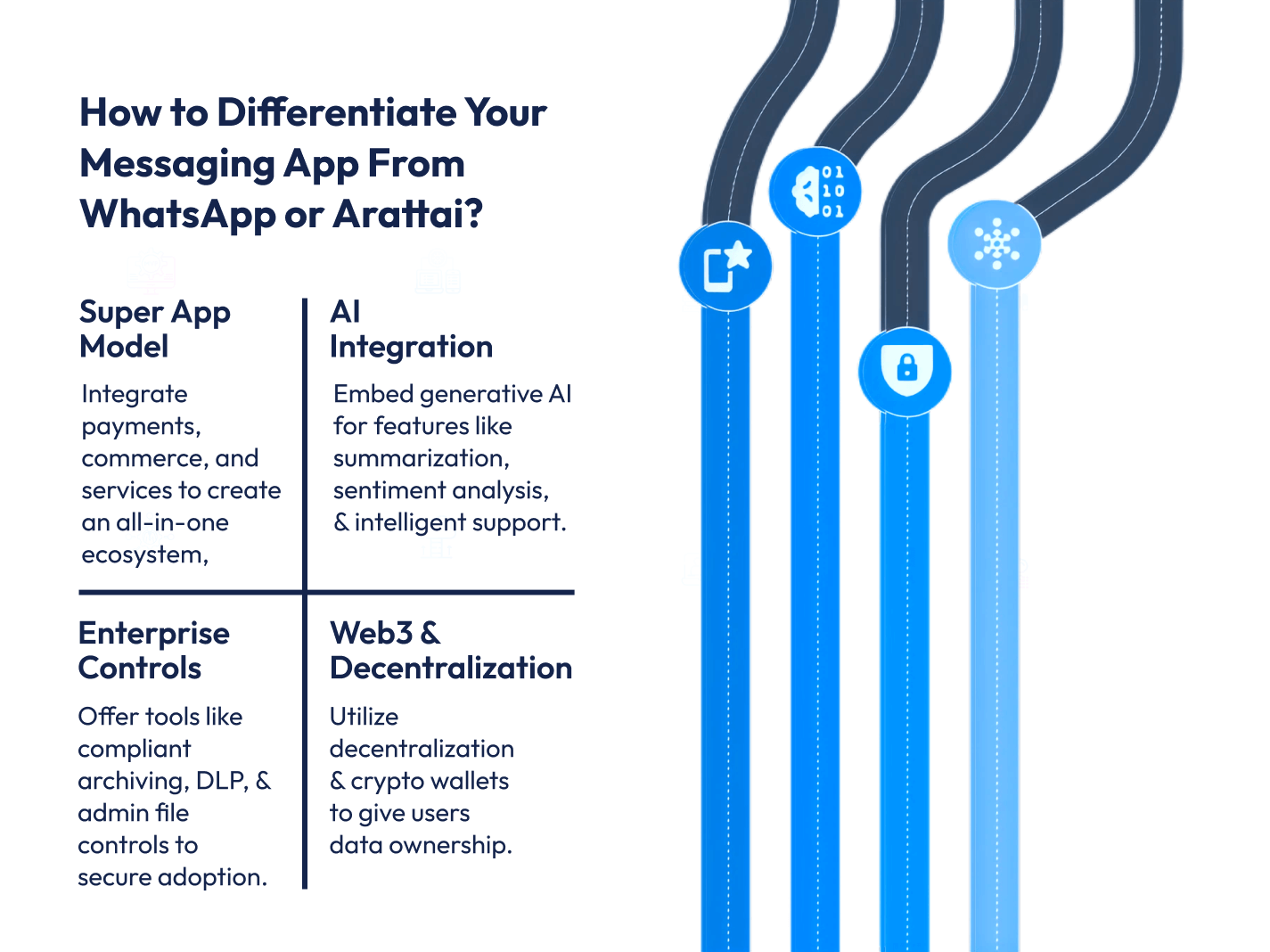
The future of messaging is all about integration. Look at WeChat, how it combines chat, payments, and shopping all in one place. Messaging apps like Arattai are already experimenting with this model by linking to Zoho Pay for UPI-based payments.
To make your chat app better and launch in the market with a USP (unique selling point), take it a step further…integrate social commerce, peer-to-peer payments, service bookings, or even local marketplaces. When users can chat, shop, and transact without switching apps, engagement skyrockets.
This approach also opens up non-intrusive monetization, where you earn from transaction fees instead of relying on ads. This is something that users today really appreciate.
AI integration is your biggest strength if you build a messaging app like Arattai or WhatsApp. Forget simple bots that just reply with pre-written messages. The future is generative AI chatbots powered by large language models (LLMs) that can actually understand context.
Here’s how AI can make your app smarter:
For enterprises, AI can reduce customer support costs, improve efficiency, and even boost conversions. Just ensure your AI chatbot development is secure, privacy-first, and enterprise-grade, because trust is non-negotiable.
👉Must Read: How AI in Product Development Revolutionizes Innovation?
While consumers love simplicity, enterprises value control. That’s where your app can go beyond WhatsApp or Arattai. Add features like:
These governance features make your app a serious contender for enterprise communication, especially in industries like finance, healthcare, and government, areas where WhatsApp simply isn’t built to compete.
The next era of messaging apps is Web3-powered, where users control their data, not companies. Instead of storing chats on a central server, decentralized chat apps distribute data across multiple nodes, reducing censorship and privacy risks.
By integrating crypto wallets like MetaMask for login and identity management, you can give users ownership of their communication data.
However, this requires expertise in Web3 app development and blockchain scalability solutions (like Ethereum Layer 2 or sidechains) to ensure smooth performance.
Founders researching how to create a messaging app with enterprise security or Web3 identity layers must focus on authentication flows, encrypted infrastructure, and compliance automation from Day 1.
If you partner with an experienced chat mobile app development company in India like Techugo, their experts can help balance decentralization with compliance (like AML and KYC). So that your app stays both innovative and regulation-ready.
Building an app like Arattai or WhatsApp is no longer about chat alone if you want to stand out with a USP. Create a connected digital ecosystem.
By merging AI, decentralization, and enterprise-grade controls, your app can not only compete but also lead the next generation of messaging platforms. Get a FREE Arattai-Like Chat App Consultation with Experts!
The cost to build a messaging app like Arattai, WhatsApp, or Telegram depends on multiple factors, from the app’s complexity and design to the tech stack and feature set.
On average, the cost to build a messaging app like Arattai ranges between $10,000 and $250,000+, depending on your goals, scale, and the team you hire.
Here’s a quick breakdown of messaging app development cost to give you a better idea of how the cost varies based on complexity and features:
| Messaging App Complexity | Features Included | Estimated Development Cost (USD) |
| Basic Messaging App | Contact sync, one-to-one chat, push notifications, profile setup, media sharing (photos/videos) | $10,000 – $40,000+ |
| Mid-Level Messaging App | All basic features + voice messages, file sharing, read receipts, group chat, basic encryption, and simple messaging app UI/UX design | $40,000 – $120,000+ |
| Advanced Messaging App | All mid-level features + voice/video calling, multi-device support, cloud backup, admin dashboard, end-to-end encryption in chat apps, and advanced messaging app UI/UX design | $120,000 – $250,000+ |
If you’re planning an MVP or full-scale product, contact Techugo, the best messaging app development company. We’ll ensure your chat system aligns with modern performance, encryption, and cross-platform needs, within your budget.
Messaging apps aren’t just about… messaging anymore. They’re turning into full-blown digital ecosystems, powered by AI, payments, and even Web3. If you’re planning to build a chat app like Arattai or want to compete with WhatsApp, this is the future you’re building for.
The days of “just chatting” are over.
Users now expect everything in one app: chat + payments + shopping + bookings + services. We’ve already seen this with WeChat, and apps like Arattai are moving in that direction with payment integration.
Privacy bills, data leaks, corporate mistrust, users are done tolerating it.
The next wave brings decentralized messaging apps (Web3 chat apps) where users own their identity and data through crypto wallets instead of phone numbers or emails.
Sure, Web3 messaging apps today feel a little “tech bro hardcore mode” – wallets, keys, weird UX. But with blockchain scaling and better UX, expect a future where:
AI isn’t just for auto-replies anymore. Future messaging apps will have AI copilots inside chat windows.
Think…
This is an era of AI-powered messaging apps, where chats are productivity boosters, not just conversations.
People chat on mobile, laptop, tablet, smartwatch, and sometimes even TV screens.
Users expect their chats to follow them everywhere, without breaking end-to-end encryption.
So future-ready messaging platforms will need:
Ankit Singh, COO at Techugo, says —
“You can only succeed and stand out if you think beyond just chat, as the future of messaging apps belongs to platforms that are a digital universe. Focus on USP, like putting privacy and user control first, using AI for real utility (not gimmicks), and building cross-device encrypted ecosystems.”
Partner With Techugo to Build Your Own Messaging App Like Arattai!
The market is huge, but users are picky. So the performance, privacy, and simplicity of a chat app decide who will win. This is where you’ll feel the need of the best mobile app development company in India to help you win.
Since 2015, from conceptualization and secure architecture to cross-platform app development and deployment, Techugo has been helping startups and enterprises turn app ideas into high-performing products that users love and stay with.
We build with purpose, scale with confidence, and design for long-term adoption, not short-term hype.
Whenever you’re ready to launch a messaging app…that not just competes but stands out in the market… that users download, trust, and return to daily, just let us know. We’re here to help you build it right.
The cost to build a messaging app like Arattai or WhatsApp varies drastically based on complexity, feature set, and team location. A basic Minimum Viable Product (MVP) can cost between $10,000 and $40,000, a mid-level app $40,000–$120,000, and an advanced, feature-rich app $120,000–$250,000+. Costs can be managed significantly by hiring experienced, specialized custom chat app developers via an outsourcing model.
Must-have secure chat app features include E2EE (end-to-end encryption in chat apps for messages, calls, and media), secure key exchange, and encrypted multi-device sync. Ensure even servers can’t access chat history as privacy-preserving architecture is non-negotiable.
The best monetization for a WhatsApp alternative without ads is transactions and utility-based earning. The dominant model involves transitioning into a “Super App,” integrating services like consumer payments (similar to Arattai integrating Zoho Pay) or social commerce, generating revenue through small transaction fees. Premium tiers, storage upgrades, and advanced group or compliance tools also work well.
Competition is achieved through strategic differentiation, primarily by leveraging a superior trust infrastructure. Focus on niche strengths: enterprise-grade privacy, Web3 identity & sovereignty, localized language support, or zero-data-monetization. Winning comes through trust, clarity, and specialization, not copying giants.
Common chat app monetization strategies are:
Write Us
sales@techugo.comOr fill this form